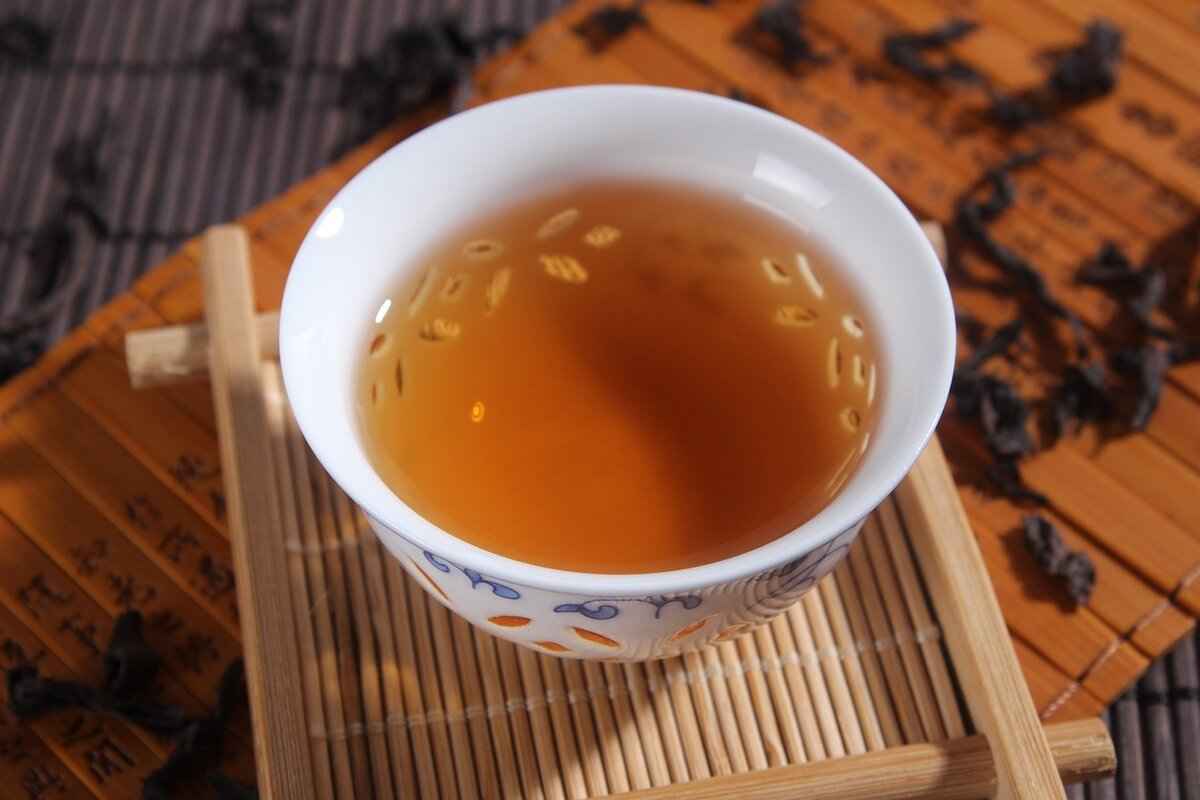Oolong tea has gained popularity in recent years as a beverage that not only delights the palate but also offers numerous health benefits. This article delves into the benefits of oolong tea in weight loss and metabolism, examining its unique properties, effects on the body, and practical ways to incorporate it into a healthy lifestyle.
Oolong tea is a traditional Chinese tea that is partially oxidized, placing it between green tea and black tea in terms of oxidation levels. This unique processing gives oolong tea a distinct flavor profile and a rich array of health benefits, making it a favorite among tea enthusiasts.
Research suggests that oolong tea may assist in weight loss by boosting metabolism and promoting fat oxidation. Understanding these mechanisms can help individuals leverage its benefits effectively.
Oolong tea contains caffeine and polyphenols, both of which are known to enhance metabolic rates. These compounds work synergistically to increase energy expenditure and support weight management.
Caffeine is a natural stimulant that can increase energy levels and promote fat burning. Studies have shown that the caffeine content in oolong tea can elevate metabolic rate, leading to increased calorie burning throughout the day.
Polyphenols are powerful antioxidants found in oolong tea that may promote fat oxidation. These compounds enhance fat breakdown during metabolism, making oolong tea a valuable addition to weight loss regimens.
To maximize the weight loss benefits of oolong tea, consider the following practical tips:
- Start your day with a cup of oolong tea instead of coffee.
- Enjoy oolong tea as an afternoon pick-me-up to curb cravings.
- Experiment with different oolong varieties to find your preferred flavor.
While oolong tea offers numerous benefits, it’s crucial to be aware of potential side effects. Excessive consumption may lead to issues such as:
- Caffeine Sensitivity: Individuals sensitive to caffeine may experience jitteriness or insomnia.
- Interactions with Medications: Oolong tea may interact with certain medications, affecting their efficacy.
Oolong tea is often compared to other types of tea, such as green and black tea. Here’s how they stack up:
Green tea is renowned for its weight loss properties, but oolong tea offers unique benefits as well. Both teas contain antioxidants, yet oolong’s distinct oxidation process gives it a different flavor and health profile.
Black tea is fully oxidized, providing a different flavor profile and health benefits. Oolong tea stands out in comparison by offering a balance of flavor and health advantages that can aid in weight management.
As more research emerges, the role of oolong tea in weight loss and metabolism may become clearer. Its unique properties and potential health benefits make it a promising addition to dietary practices aimed at enhancing overall wellness.

What is Oolong Tea?
Oolong tea is a traditional Chinese beverage that has gained popularity worldwide due to its unique flavor profile and numerous health benefits. This tea is characterized by its partially oxidized leaves, which places it in between green and black tea in terms of oxidation levels. The unique processing method of oolong tea results in a complex flavor that can range from floral and fruity to thick and toasty, making it a favorite among tea enthusiasts.
Oolong tea is often described as a semi-oxidized tea, which means it undergoes a specific process that allows it to retain some of the fresh characteristics of green tea while also developing the deeper flavors associated with black tea. This unique processing involves withering the leaves under the sun, followed by bruising them to encourage oxidation, and finally, pan-firing or baking them to stop the oxidation process. The result is a tea that offers a diverse range of flavors and aromas, appealing to various palates.
Research indicates that oolong tea may assist in weight loss by boosting metabolism and promoting fat oxidation. The presence of caffeine and polyphenols in oolong tea plays a crucial role in these processes. Understanding these mechanisms can help individuals leverage its benefits effectively.
The combination of caffeine and polyphenols in oolong tea is known to enhance metabolic rates significantly. Caffeine acts as a natural stimulant, increasing energy levels and fat burning. Meanwhile, polyphenols are powerful antioxidants that may promote fat oxidation, enhancing the body’s ability to break down fat during metabolism.
Caffeine is a well-known compound that can elevate energy levels and improve physical performance. In the context of oolong tea, the caffeine content can stimulate the central nervous system, leading to increased energy expenditure and fat oxidation. Regular consumption of oolong tea may, therefore, support weight management efforts.
Polyphenols, particularly catechins found in oolong tea, are believed to enhance fat breakdown during metabolism. These compounds may also inhibit the formation of new fat cells, contributing to overall weight loss. Studies suggest that the antioxidant properties of polyphenols can improve metabolic health, making oolong tea a valuable addition to a weight loss regimen.
To maximize the weight loss benefits of oolong tea, it’s essential to know how to incorporate it into your daily routine. Here are some practical tips:
- Start Your Day: Begin your morning with a cup of oolong tea to kickstart your metabolism.
- Post-Workout Boost: Enjoy a cup after exercising to aid in recovery and fat oxidation.
- Mindful Drinking: Replace sugary beverages with oolong tea throughout the day to reduce calorie intake.
While oolong tea offers numerous benefits, it’s crucial to be aware of potential side effects. Excessive consumption of oolong tea may lead to issues such as caffeine sensitivity, which can cause jitteriness or insomnia. Individuals sensitive to caffeine should monitor their intake carefully.
Oolong tea may interact with certain medications, affecting their efficacy. It’s essential to consult healthcare providers before adding oolong tea to your regimen, especially for those on medication.
Oolong tea is often compared to other types of tea, such as green and black tea. While green tea is renowned for its weight loss properties, oolong tea offers a unique combination of benefits that may appeal to those looking for variety in their tea choices.
Both oolong and green tea contain beneficial compounds that can aid in weight loss; however, oolong tea’s unique oxidation process provides a different flavor and potential health benefits. This makes oolong tea a worthy alternative for those seeking something beyond green tea.
Unlike black tea, which is fully oxidized, oolong tea retains some of the fresh characteristics of green tea. This results in a distinct flavor profile that can be both refreshing and satisfying. The lighter oxidation in oolong tea may also contribute to its unique health benefits, particularly in weight management.

How Does Oolong Tea Aid Weight Loss?
Oolong tea has garnered attention in the health community for its potential benefits in weight management. This traditional Chinese beverage is not only celebrated for its unique taste but also for its ability to assist in weight loss. In this section, we will explore the mechanisms through which oolong tea aids weight loss, including its effects on metabolism and fat oxidation.
Research indicates that oolong tea may play a significant role in weight loss by boosting metabolism and promoting fat oxidation. Understanding the underlying mechanisms can empower individuals to leverage its benefits effectively in their weight loss journeys.
Oolong tea is rich in caffeine and polyphenols, both of which are known to enhance metabolic rates. Studies have shown that these compounds can increase energy expenditure, making it easier for the body to burn calories. The combination of caffeine and polyphenols in oolong tea works synergistically to stimulate the metabolism, leading to greater fat burning.
Caffeine, a natural stimulant found in oolong tea, can significantly affect weight management. It increases energy levels and enhances fat burning by mobilizing fatty acids from fat tissues. This process allows the body to utilize fat as a source of energy, contributing to weight loss. Additionally, caffeine may also help to suppress appetite, making it easier to adhere to a calorie-restricted diet.
Polyphenols are powerful antioxidants present in oolong tea that may promote fat oxidation. These compounds help enhance fat breakdown during metabolism, thereby increasing the amount of fat burned for energy. Research suggests that polyphenols can also improve insulin sensitivity, which is crucial for effective fat metabolism. By incorporating oolong tea into your diet, you may experience improved fat oxidation and better overall metabolic health.
To maximize the weight loss benefits of oolong tea, it is essential to know how to incorporate it into your daily routine. Here are some practical tips:
- Start your day with oolong tea: Replacing your morning coffee with oolong tea can give you a gentle caffeine boost without the jitters.
- Enjoy it before workouts: Consuming oolong tea about 30 minutes before exercising may enhance fat burning during your workout.
- Experiment with flavors: Oolong tea can be enjoyed plain or with natural flavorings like lemon or honey, making it a versatile beverage.
While oolong tea offers numerous benefits, it is important to be aware of potential side effects. Excessive consumption may lead to issues such as caffeine sensitivity, causing jitteriness or insomnia. It is advisable for individuals sensitive to caffeine to monitor their intake and consider decaffeinated options.
Oolong tea may interact with certain medications, potentially affecting their efficacy. It is crucial to consult with healthcare providers before adding oolong tea to your regimen, especially if you are on medication or have underlying health conditions.
Oolong tea is often compared to other types of tea, such as green and black tea. Each variety has unique health benefits and weight loss effects. Oolong tea, with its unique oxidation process, provides a balance of benefits that can complement a weight loss strategy.
In summary, oolong tea presents a promising option for those looking to enhance their weight loss efforts through natural means. By understanding its metabolism-boosting properties and incorporating it wisely into your diet, you can leverage its benefits for a healthier lifestyle.
Metabolism Boosting Properties
Oolong tea is not just a delightful beverage; it is also a powerful ally in the quest for weight management and enhanced metabolic function. This fascinating tea, a staple in traditional Chinese culture, is known for its unique blend of flavors and health benefits. One of the most compelling aspects of oolong tea is its ability to boost metabolism, thanks to its rich content of caffeine and polyphenols.
How Do Caffeine and Polyphenols Work Together?
The combination of caffeine and polyphenols in oolong tea creates a synergistic effect that can lead to increased energy expenditure. Caffeine acts as a natural stimulant, enhancing alertness and energy levels. This boost in energy can lead to a greater calorie burn throughout the day. On the other hand, polyphenols, particularly catechins, are known for their antioxidant properties and their ability to promote fat oxidation.
What is the Role of Caffeine in Metabolism?
- Increased Thermogenesis: Caffeine stimulates thermogenesis, which is the process of heat production in organisms. This increase in body temperature can lead to higher calorie burning.
- Enhanced Fat Oxidation: Studies have shown that caffeine can enhance the rate at which the body burns fat during exercise and at rest, making it a valuable component in weight loss.
- Improved Exercise Performance: The energy boost from caffeine can lead to improved physical performance, allowing individuals to engage in more intense workouts, which further aids in weight loss.
How Do Polyphenols Contribute to Fat Oxidation?
Polyphenols found in oolong tea, such as flavonoids, play a significant role in fat metabolism. They help in:
- Reducing Fat Absorption: Polyphenols can inhibit the absorption of dietary fats, leading to lower overall fat accumulation in the body.
- Enhancing Lipolysis: This process involves breaking down stored fat into free fatty acids, which can then be used as energy. Polyphenols encourage lipolysis, making fat more accessible for energy use.
- Regulating Blood Sugar Levels: By improving insulin sensitivity, polyphenols can help in managing blood sugar levels, which is crucial for maintaining a healthy metabolism.
What Are the Combined Effects of Caffeine and Polyphenols?
The combined effects of caffeine and polyphenols in oolong tea create a powerful metabolic boost. Research indicates that consuming oolong tea can increase metabolic rates by up to 10% for several hours after consumption. This effect can be particularly beneficial when combined with regular physical activity and a balanced diet.
Incorporating oolong tea into your daily routine can be a simple yet effective strategy for those looking to enhance their metabolic rate and support weight loss efforts. Whether enjoyed as a hot beverage or iced, oolong tea offers a flavorful and healthful way to stay hydrated while boosting your metabolism.
In summary, the metabolism-boosting properties of oolong tea, driven by the synergistic effects of caffeine and polyphenols, make it an excellent choice for anyone aiming for weight loss and improved metabolic health. Embracing this tea as part of a balanced lifestyle can lead to significant health benefits.
Caffeine’s Role in Weight Management
Caffeine is widely recognized as a natural stimulant that plays a significant role in enhancing energy levels and promoting fat burning. Within the realm of weight management, caffeine’s presence in oolong tea has garnered attention for its potential benefits. This section delves into how caffeine contributes to weight loss efforts, particularly through its effects on metabolism and fat oxidation.
How Does Caffeine Work?
Caffeine operates primarily by blocking the action of adenosine, a neurotransmitter that promotes sleep and relaxation. By doing so, it increases the release of other neurotransmitters like dopamine and norepinephrine, which enhance alertness and energy levels. This mechanism not only helps in improving focus but also plays a crucial role in boosting metabolic rates.
Boosting Metabolism
Research indicates that caffeine can increase the metabolic rate by approximately 3-11%, depending on individual factors such as body composition and tolerance to caffeine. This increase in metabolism means that the body burns more calories even at rest, which is a vital aspect of weight management. Furthermore, caffeine can help mobilize fat from fat tissues, making it available for use as energy during physical activities.
Enhancing Fat Oxidation
Several studies suggest that caffeine can significantly enhance fat oxidation during exercise. When consumed before a workout, caffeine has been shown to improve performance and endurance, allowing individuals to engage in longer and more intense workouts. This, in turn, can lead to a greater overall calorie burn, further supporting weight loss efforts.
How Much Caffeine is Effective?
- For optimal benefits, a moderate caffeine intake of 200-400 mg per day is often recommended.
- This amount can be found in about 2-4 cups of oolong tea, depending on the strength and brewing time.
- It’s essential to consider individual tolerance levels, as some people may experience side effects from lower amounts.
Incorporating Oolong Tea into Your Routine
To leverage the benefits of caffeine in oolong tea, individuals can incorporate it into their daily routine in various ways:
1. Drink a cup of oolong tea before workouts to enhance performance.2. Substitute sugary beverages with oolong tea for a healthier alternative.3. Experiment with different brewing times and temperatures to find the perfect flavor that suits your palate.
Potential Side Effects
While caffeine can be beneficial, it’s crucial to be aware of potential side effects, especially for those sensitive to caffeine. Common side effects may include:
- Jitteriness
- Increased heart rate
- Insomnia
To mitigate these effects, it’s advisable to monitor caffeine intake and adjust consumption according to personal tolerance levels. Consulting with a healthcare provider can also provide tailored advice, especially for individuals with underlying health conditions.
Conclusion
In summary, caffeine plays a pivotal role in weight management through its ability to boost metabolism and enhance fat oxidation. By incorporating oolong tea into a balanced diet and active lifestyle, individuals may find an effective ally in their weight loss journey. As with any dietary change, moderation and awareness of personal health are key to reaping the benefits of caffeine in oolong tea.
Polyphenols and Fat Oxidation
Polyphenols are a group of naturally occurring compounds found in various plants, including oolong tea. These compounds are renowned for their antioxidant properties, which play a significant role in promoting overall health. One of the most intriguing aspects of polyphenols is their potential to enhance fat oxidation during metabolism, making them particularly interesting for those seeking weight loss solutions.
Oolong tea, a traditional Chinese beverage, is rich in polyphenols, particularly catechins and theaflavins. These compounds have been shown to influence metabolic processes in several ways. First and foremost, polyphenols may help to increase the rate of lipolysis, the process through which stored fats are broken down into fatty acids and glycerol. This increase in fat breakdown can lead to a higher rate of energy expenditure, contributing to weight loss.
Research indicates that polyphenols in oolong tea can also enhance the body’s ability to oxidize fat during exercise. This means that when individuals consume oolong tea, they may experience a greater utilization of fat as a source of energy during physical activity. This effect is particularly beneficial for those looking to optimize their workouts and improve their overall fitness levels.
Moreover, the consumption of polyphenol-rich oolong tea can lead to improved insulin sensitivity. When insulin sensitivity is heightened, the body becomes more efficient at managing blood sugar levels and utilizing fats for energy. This can further support weight management and metabolic health.
In addition to these metabolic benefits, polyphenols possess anti-inflammatory properties that can aid in reducing chronic inflammation, a condition often linked to obesity and metabolic disorders. By mitigating inflammation, polyphenols may help create a more favorable environment for weight loss and overall health.
To maximize the benefits of polyphenols in oolong tea, it is essential to incorporate this beverage into a balanced diet. Drinking oolong tea regularly, particularly before meals or workouts, can enhance its effects on fat oxidation and metabolism. Additionally, pairing oolong tea with a diet rich in whole foods, such as fruits, vegetables, and lean proteins, can further amplify its benefits.
In summary, the polyphenols found in oolong tea play a crucial role in promoting fat oxidation and enhancing metabolic processes. By understanding how these compounds work, individuals can better leverage the benefits of oolong tea as part of their weight loss and health strategies. Incorporating this flavorful tea into a daily routine may not only support weight management but also contribute to overall well-being.
Incorporating Oolong Tea into Your Diet
Incorporating oolong tea into your daily diet can be a game changer for those looking to enhance their weight loss journey. This unique tea, known for its distinct flavor and numerous health benefits, can be seamlessly integrated into various aspects of your routine. Here are some practical tips for making oolong tea a staple in your diet.
Timing can significantly impact the effectiveness of oolong tea in your weight loss efforts. Here are some optimal times to enjoy your cup:
- Morning Boost: Start your day with a cup of oolong tea to kickstart your metabolism.
- Pre-Workout: Consuming oolong tea before exercise can enhance fat oxidation and improve performance.
- Mid-Afternoon Slump: Replace your usual coffee with oolong tea to avoid caffeine crashes and keep your energy levels steady.
Preparation plays a crucial role in unlocking the health benefits of oolong tea. Follow these steps for the best results:
1. Start with high-quality loose leaf oolong tea.2. Heat water to about 190°F (88°C) to avoid bitterness.3. Steep for 3-5 minutes, depending on your taste preference.4. Enjoy it plain or with a slice of lemon for added flavor.
Oolong tea can complement your meals, enhancing both flavor and health benefits. Consider these pairing suggestions:
- With Breakfast: Enjoy oolong tea alongside a healthy breakfast of oatmeal or fruit to aid digestion.
- During Lunch: Pair it with salads or lean proteins to promote fat burning.
- With Dinner: Sip oolong tea after dinner to support metabolism while enjoying a light dessert.
To keep your oolong tea consumption exciting, try incorporating it into different recipes:
- Oolong Tea Smoothie: Blend brewed oolong tea with fruits and yogurt for a refreshing drink.
- Oolong Tea Infused Rice: Use oolong tea instead of water to cook rice for a subtle flavor twist.
- Oolong Tea Marinades: Use brewed oolong tea as a base for marinades to enhance the flavor of meats.
Consistency is key when it comes to reaping the benefits of oolong tea. Here are some tips to help you maintain a regular routine:
- Set Reminders: Use your phone or planner to remind you to drink oolong tea at specific times.
- Join a Tea Club: Engage with others who appreciate oolong tea, sharing recipes and tips.
- Track Your Progress: Keep a journal to note how oolong tea impacts your energy levels and weight loss journey.
In conclusion, incorporating oolong tea into your daily routine is a simple yet effective way to enhance your weight loss efforts. By understanding the best times to drink it, how to prepare it, and ways to pair it with meals, you can enjoy its numerous benefits while savoring its unique flavor. Experimenting with recipes and maintaining consistency will further ensure that oolong tea becomes a delightful part of your healthy lifestyle.

Are There Any Risks or Side Effects?
Oolong tea is celebrated for its myriad health benefits, particularly in the realms of weight loss and metabolism. However, like any other food or beverage, it is essential to recognize that excessive consumption can lead to certain risks and side effects. This section aims to shed light on the potential downsides of oolong tea, ensuring that enthusiasts can enjoy its benefits while remaining cautious.
While oolong tea is generally safe for most people, understanding its potential risks is vital for responsible consumption. Below are some of the key concerns associated with excessive intake:
- Caffeine Sensitivity: Oolong tea contains caffeine, which can lead to side effects in individuals sensitive to this stimulant. Symptoms may include jitteriness, insomnia, and increased heart rate. It is advisable for those who are caffeine-sensitive to monitor their intake and consider decaffeinated options.
- Gastrointestinal Issues: Some individuals may experience digestive discomfort, such as nausea or stomach cramps, especially when consuming oolong tea on an empty stomach. It is recommended to enjoy this tea after meals to mitigate such effects.
- Iron Absorption: Oolong tea, like other types of tea, contains tannins that can inhibit iron absorption in the body. Individuals with iron deficiency or those at risk should consider consuming oolong tea between meals rather than with food.
- Interactions with Medications: Oolong tea may interact with certain medications, particularly those affecting the heart or blood pressure. It is crucial to consult a healthcare provider before incorporating oolong tea into your regimen, especially if you are on medication.
Moderation is key when it comes to enjoying oolong tea. Most health experts recommend limiting consumption to 2-3 cups per day to reap its benefits without experiencing adverse effects. This amount allows individuals to enjoy the positive attributes of oolong tea while minimizing risks associated with excessive caffeine and other compounds.
While oolong tea is beneficial for many, certain groups should exercise caution:
- Pregnant or Nursing Women: Due to its caffeine content, pregnant or nursing women should limit their intake of oolong tea to avoid potential risks to their health and that of their baby.
- Individuals with Heart Conditions: Those with pre-existing heart conditions should consult their doctor, as caffeine can exacerbate certain cardiovascular issues.
- People with Anxiety Disorders: Given its stimulant properties, oolong tea may heighten anxiety symptoms in susceptible individuals.
Oolong tea can be a delightful and healthful addition to your diet, offering numerous benefits for weight loss and metabolism. However, being aware of its potential side effects and risks is crucial for safe consumption. By understanding your own body’s responses and moderating intake, you can enjoy the rich flavors and health benefits of oolong tea while minimizing any adverse effects. As always, if in doubt, consult with a healthcare professional to tailor your tea consumption to best suit your health needs.
Caffeine Sensitivity
When it comes to enjoying oolong tea, individuals need to be mindful of their . Caffeine, a natural stimulant found in many teas, can lead to various side effects for those who are particularly sensitive. Common reactions include jitteriness, insomnia, and increased heart rate. Understanding how to manage caffeine intake is essential for maximizing the benefits of oolong tea while minimizing discomfort.
Caffeine sensitivity varies from person to person, influenced by factors such as genetics, tolerance levels, and overall health. Individuals who are sensitive may experience heightened reactions even with small amounts of caffeine. Consequently, it is vital for these individuals to monitor their consumption of oolong tea, which typically contains about 30-50 mg of caffeine per cup, depending on brewing time and leaf quality.
For those who enjoy oolong tea but are sensitive to caffeine, there are several strategies to manage intake effectively:
- Limit Serving Size: Start with smaller servings to gauge your body’s reaction. Consider brewing a smaller cup or using fewer tea leaves initially.
- Choose Lower Caffeine Varieties: Some oolong teas have lower caffeine content. Look for brands that specify their caffeine levels or opt for lightly oxidized varieties.
- Adjust Brewing Time: Shortening the steeping time can reduce caffeine extraction. Experiment with steeping for 1-2 minutes instead of the usual 3-5 minutes.
- Alternate with Herbal Teas: Incorporate herbal teas into your routine on days when you want to limit caffeine. Herbal teas like chamomile or peppermint are naturally caffeine-free.
It’s crucial to be aware of the signs that may indicate you’ve consumed too much caffeine. Symptoms can include:
- Increased Heart Rate: A noticeable rise in heart rate can be a warning sign of excessive caffeine intake.
- Restlessness: Feelings of anxiety or restlessness may occur, making it difficult to relax.
- Difficulty Sleeping: If you find it hard to fall asleep or stay asleep, it could be linked to caffeine consumption.
For individuals with known caffeine sensitivity or those taking medications, consulting a healthcare provider is advisable before incorporating oolong tea into their diet. Healthcare professionals can provide personalized recommendations based on individual health conditions and medication interactions.
Managing caffeine sensitivity while enjoying oolong tea is achievable with mindful practices. By understanding personal limits and implementing strategies to control intake, individuals can savor the unique flavors and health benefits of oolong tea without compromising their well-being.
Interactions with Medications
When considering the incorporation of oolong tea into your daily regimen, it is crucial to understand its potential interactions with various medications. While oolong tea is celebrated for its numerous health benefits, including weight loss and metabolism enhancement, it can also affect the efficacy of certain medications. This section will explore the importance of consulting healthcare providers before making any changes to your consumption habits.
How Can Oolong Tea Affect Medications?
Oolong tea contains several bioactive compounds, including caffeine, polyphenols, and flavonoids, which can interact with medications in various ways. These interactions may lead to either an increase or decrease in the effectiveness of the medications, and in some cases, they can even cause adverse effects. Below are some examples of how oolong tea may interact with different types of medications:
- Blood Thinners: Oolong tea may enhance the effects of anticoagulant medications, such as warfarin, due to its high polyphenol content. This can increase the risk of bleeding.
- Antidepressants: The caffeine in oolong tea can affect the metabolism of certain antidepressants, potentially altering their effectiveness and leading to side effects.
- Diabetes Medications: Oolong tea may lower blood sugar levels, which could interact with diabetes medications, leading to hypoglycemia if not monitored properly.
Consulting Healthcare Providers
Given the potential for these interactions, it is imperative to consult with a healthcare provider before adding oolong tea to your diet, especially if you are currently taking medications. A healthcare professional can provide personalized advice based on your health history and medication regimen. They can help you understand:
- The potential risks associated with oolong tea consumption.
- How to safely incorporate oolong tea into your lifestyle.
- Alternative options if oolong tea is not advisable for your situation.
Recognizing Symptoms of Interaction
Being aware of the symptoms of potential interactions is also essential. If you experience any unusual side effects after consuming oolong tea while on medication, such as increased heart rate, dizziness, or unusual bleeding, it is important to seek medical attention immediately. Keeping a record of your tea consumption and any symptoms can aid healthcare providers in assessing your situation effectively.
Conclusion
In summary, while oolong tea offers numerous health benefits, it is vital to approach its consumption cautiously, particularly if you are on medication. Always prioritize your health by consulting with healthcare professionals who can guide you in making informed decisions about your dietary choices. By doing so, you can enjoy the benefits of oolong tea while minimizing any potential risks associated with medication interactions.

Comparing Oolong Tea to Other Teas
When it comes to tea, the variety is vast, with each type offering its own unique flavor profile and health benefits. Oolong tea is often compared to green and black tea, two popular choices among tea enthusiasts. This section evaluates the differences in health benefits and weight loss effects among these teas, providing a comprehensive overview for those looking to make informed choices.
What Makes Oolong Tea Unique?
Oolong tea is partially oxidized, placing it in between green and black tea in terms of oxidation levels. This unique processing method not only affects its flavor but also its health benefits. While green tea is known for its high catechin content, oolong tea offers a balance of catechins and theaflavins, which can be beneficial for weight management.
How Does Oolong Tea Compare to Green Tea?
- Antioxidant Properties: Both oolong and green teas are rich in antioxidants, which help combat oxidative stress. However, oolong tea has a different composition of antioxidants that may enhance its metabolism-boosting effects.
- Weight Loss Effects: Green tea is famous for its weight loss properties due to its high concentration of catechins. Oolong tea, while slightly less potent, still promotes fat oxidation and can be a valuable addition to a weight loss regimen.
- Caffeine Content: Oolong tea generally contains more caffeine than green tea, which can aid in boosting energy levels and enhancing fat burning during workouts.
Oolong vs. Black Tea: A Flavor and Health Perspective
- Oxidation Levels: Black tea is fully oxidized, giving it a stronger flavor and darker color compared to oolong. This full oxidation alters the tea’s chemical composition, impacting its health benefits.
- Health Benefits: While black tea is known to support heart health and digestion, oolong tea’s combination of catechins and theaflavins may provide a more balanced approach to weight management.
- Impact on Metabolism: Oolong tea’s unique compounds can boost metabolism and fat oxidation more effectively than black tea, making it a better choice for those focused on weight loss.
Which Tea Should You Choose?
Ultimately, the choice between oolong, green, and black tea depends on personal preferences and health goals. If you’re seeking a tea that supports weight loss while offering a unique flavor experience, oolong tea may be the ideal option. However, if you prefer a lighter taste, green tea could be more suitable. For those who enjoy stronger flavors, black tea remains a classic choice.
Final Thoughts on Oolong Tea’s Role
In conclusion, oolong tea stands out in the realm of teas, offering a blend of benefits that cater to both health and taste. By understanding the differences among these teas, individuals can make informed decisions that align with their wellness goals. Incorporating oolong tea into a balanced diet may not only enhance flavor but also support weight loss and overall health.
Oolong vs. Green Tea
Oolong tea and green tea are two popular varieties of tea that have garnered attention for their potential health benefits, particularly in the realm of weight loss. While both teas originate from the same plant, Camellia sinensis, they differ significantly in terms of processing, flavor, and health properties. This section aims to explore the similarities and differences between oolong and green tea, particularly in relation to their weight loss benefits.
- Processing: Oolong tea is partially oxidized, which gives it a unique flavor profile that lies between green and black tea. In contrast, green tea is unoxidized, preserving its green color and fresh taste.
- Caffeine Content: Oolong tea generally contains more caffeine than green tea, which may enhance its metabolism-boosting properties. This difference can influence energy levels and fat-burning capabilities.
- Flavor Profile: Oolong tea has a complex flavor, often described as floral or fruity, while green tea tends to have a lighter, more vegetal taste. This can affect personal preference and consumption habits.
Both oolong and green tea have been studied for their potential effects on weight loss. Research suggests that the polyphenols found in both teas may aid in fat oxidation and improve metabolic rates. However, oolong tea’s unique combination of caffeine and polyphenols may provide an additional edge in promoting weight loss.
Oolong tea is rich in antioxidants, which can help combat oxidative stress in the body. The presence of catechins in oolong tea is believed to enhance fat metabolism. Studies have shown that regular consumption of oolong tea can lead to a decrease in body fat, especially when combined with a balanced diet and exercise.
Green tea is widely recognized for its health benefits, particularly its role in weight management. The high concentration of EGCG (epigallocatechin gallate) in green tea has been linked to increased fat burning and improved metabolic function. Additionally, green tea may help regulate blood sugar levels, making it a valuable addition to a healthy lifestyle.
The effectiveness of oolong versus green tea for weight loss may vary based on individual responses. Some people may find that oolong tea, with its higher caffeine content, provides a more noticeable boost in energy and metabolism. Others may prefer green tea for its milder taste and well-documented health benefits.
To maximize the benefits of both teas, consider the following tips:
- Daily Consumption: Aim to drink 2-3 cups of either tea daily to reap the weight loss benefits.
- Pair with Healthy Foods: Enjoy your tea alongside a balanced diet rich in fruits, vegetables, and lean proteins.
- Experiment with Brewing: Different brewing times and temperatures can alter the flavor and health benefits of the tea, so feel free to experiment.
In conclusion, while both oolong and green tea offer unique health benefits and potential weight loss properties, individual preferences and responses may dictate which tea is more effective for you. Whether you choose the rich, complex flavors of oolong or the fresh, grassy notes of green tea, incorporating either into your daily routine can contribute positively to your health and weight management goals.
Oolong vs. Black Tea
When it comes to understanding the differences between oolong tea and black tea, it’s essential to consider their unique properties, flavor profiles, and health benefits. Both teas have their own distinct characteristics, but oolong tea stands out, particularly in the realm of weight management.
Oolong tea is partially oxidized, which gives it a flavor profile that lies between green and black tea. This unique oxidation process results in a diverse range of flavors, from floral and fruity to rich and creamy. In contrast, black tea is fully oxidized, leading to a stronger, more robust flavor. This difference in oxidation not only affects the taste but also the health benefits associated with each type of tea.
Research indicates that oolong tea may offer specific advantages for those looking to manage their weight. While black tea also has health benefits, oolong tea has been shown to enhance fat oxidation and boost metabolism more effectively. This section delves into the specific mechanisms through which oolong tea aids in weight management.
Oolong tea contains both caffeine and polyphenols, compounds that are known to enhance metabolic rates. The caffeine in oolong tea stimulates the central nervous system, increasing energy levels and promoting fat burning. In comparison, while black tea also contains caffeine, its effects on metabolism may not be as pronounced as those of oolong tea.
Polyphenols are powerful antioxidants found in oolong tea that contribute to fat oxidation. These compounds help to break down fat during metabolism, making oolong tea a valuable addition to a weight management plan. Black tea contains polyphenols as well, but the specific types and concentrations differ, potentially affecting their efficacy in promoting fat loss.
The flavor of oolong tea is often described as complex and layered, featuring floral notes and a lingering sweetness. This makes it a delightful choice for tea enthusiasts. On the other hand, black tea is known for its strong, bold flavor, often accompanied by astringency. The choice between the two may come down to personal preference, but those seeking a more nuanced flavor may lean towards oolong tea.
For those interested in leveraging the benefits of oolong tea for weight management, it can be easily incorporated into daily routines. Enjoying a cup in the morning or as an afternoon pick-me-up can provide both hydration and metabolic support. Additionally, using oolong tea as a base for iced teas or blended with fruits can enhance its appeal.
While oolong tea offers numerous benefits, it’s important to be aware of potential side effects. Individuals sensitive to caffeine may experience jitteriness or insomnia. Moreover, oolong tea can interact with certain medications, so it’s advisable to consult with a healthcare provider before making it a regular part of your diet.
In summary, oolong tea presents a compelling option for those focused on weight management. Its unique properties, combined with its ability to enhance metabolism and promote fat oxidation, make it an excellent choice for health-conscious individuals. While black tea also offers benefits, oolong tea’s distinct advantages in weight management set it apart. As research continues to evolve, the role of oolong tea in dietary practices will likely become even clearer.

Conclusion: The Future of Oolong Tea in Weight Loss
As the landscape of dietary practices evolves, the potential of oolong tea in weight loss and metabolism is becoming increasingly significant. Recent studies have shed light on the unique properties of oolong tea, suggesting that its benefits may extend beyond mere enjoyment to play a vital role in weight management strategies.
Oolong tea, with its distinct flavor profile and partially oxidized leaves, offers a unique combination of benefits that may aid in weight loss. Research indicates that oolong tea can enhance metabolic rates, making it a valuable addition to any weight loss regimen. The presence of caffeine and polyphenols in oolong tea contributes to its metabolism-boosting properties, promoting fat oxidation and energy expenditure.
What does the future hold for oolong tea? As more studies emerge, we may see a clearer understanding of how oolong tea can be effectively integrated into dietary practices. Current research is exploring various aspects, including:
- Enhanced Fat Oxidation: Ongoing studies are examining how the polyphenols in oolong tea interact with the body’s metabolic processes to enhance fat breakdown.
- Long-term Weight Management: Future research may focus on the long-term effects of oolong tea consumption on weight maintenance, providing insights into sustainable dietary practices.
- Personalized Nutrition: As nutritional science advances, there may be a push towards personalized dietary recommendations, including tailored oolong tea consumption based on individual metabolic responses.
Furthermore, oolong tea’s potential role in appetite regulation is another area of interest. Some studies suggest that the compounds in oolong tea may help in reducing hunger pangs, thereby assisting individuals in adhering to their dietary goals. This could be particularly beneficial for those struggling with cravings or emotional eating.
As more individuals seek natural and holistic approaches to weight loss, oolong tea may emerge as a popular choice for those looking to enhance their metabolic health. The versatility of oolong tea allows it to be easily incorporated into various dietary plans, making it accessible for a wide audience.
In conclusion, the future applications of oolong tea in dietary practices appear promising. With continued research, we may uncover more about its benefits, leading to a broader acceptance of oolong tea as a supportive tool in weight loss and metabolism enhancement. As we gain a deeper understanding of its properties, oolong tea could become a staple in health-conscious diets around the world.
Frequently Asked Questions
- What are the main benefits of oolong tea for weight loss?
Oolong tea can boost metabolism and promote fat oxidation, making it a great ally in weight loss efforts. Its unique blend of caffeine and polyphenols helps increase energy expenditure, which can lead to more effective weight management.
- How should I incorporate oolong tea into my daily routine?
To enjoy the benefits of oolong tea, try drinking 2-3 cups a day. You can savor it hot or iced, and even use it as a base for smoothies. Just remember to pair it with a balanced diet and regular exercise for the best results!
- Are there any side effects associated with oolong tea?
While oolong tea is generally safe, excessive consumption may lead to side effects, especially for those sensitive to caffeine. Possible issues include jitteriness or insomnia, so it’s wise to monitor your intake and consult a healthcare provider if you have concerns.
- How does oolong tea compare to green and black tea?
Oolong tea sits between green and black tea in terms of oxidation. While green tea is known for its high antioxidant levels, oolong tea offers a unique flavor and a balanced approach to weight loss, combining the benefits of both types!














